Legislative session enters home stretch with no budget fix
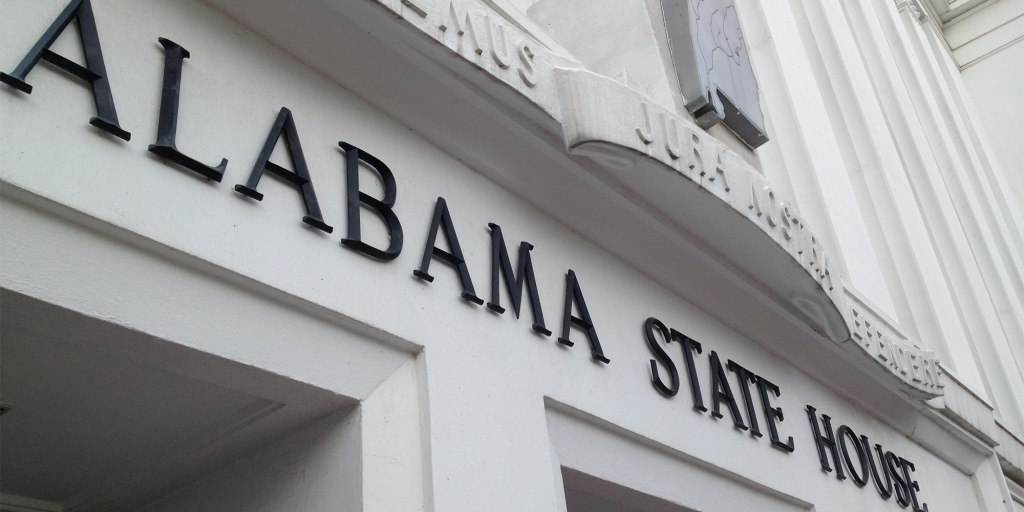
Alabama lawmakers on Tuesday begin the home stretch of the legislative session with their biggest challenge still unsolved: a shortfall in the general fund budget. There are four legislative meeting days remaining and so far no consensus on how to handle a projected $200 million shortfall in next year’s general fund budget. Legislators have been unable to agree on tax increases or on a proposal to shift some money from the education budget to avoid cuts to key state agencies. “I think most are resigned to a special session,” Senate Finance and Taxation General Fund Chairman Arthur Orr, a Republican of Decatur, said. The stalemate comes after months of negotiations by legislators on ways to fill the budget hole and warnings by Gov. Robert Bentley about the severe cuts to state services that will occur if they don’t. Lawmakers have rejected Bentley’s call for $541 million in new taxes. House GOP members temporarily backed a smaller $151 million tax increase but withdrew it after Senate leaders said GOP senators would oppose it. The session is expected to conclude next week, but by law must end by June 15. Here is a look at the status of other issues before lawmakers this session: Payday loans An effort to limit what payday lenders can charge on the short-term loans appears to be stalling again this legislative session. A House committee approved a bill that would give borrowers more time to repay a loan, taking the window from 14 days to six months. However, the bill has not gotten a vote on the House floor. Alabama Accountability Act Alabama lawmakers are close to making changes to a controversial school choice program that helps families pay for private school. A conference committee is considering the bill to expand the yearly cap on the tax credits that fuel the scholarships from $25 million to $30 million. It would also tighten income requirements on the scholarships and increase reporting requirements on the organizations that grant the scholarships. Abortion The bill that would ban abortion clinics within 2,000 feet of public K-12 schools has been approved by the House of Representatives but has not gotten a Senate vote. The bill would force a Huntsville abortion clinic, one of the state’s five abortion clinics, to move or close. Another House bill would ban abortions once a fetal heartbeat can be detected, which can happen as early as six weeks into a pregnancy, but has not gotten a floor vote. Marriage licenses/Gay marriage A bill, brought in response to the possibility of the U.S Supreme Court legalizing same-sex marriage, would get Alabama out of the marriage license business altogether. The bill would do away with current state marriage licenses issued by probate judges. Instead, couples would take a contract witnessed by a couple’s minister or attorney. The state Senate approved the bill but it has not gotten a House vote. Gambling A bill aimed at allowing a lottery and casinos in the state is dead for the session. The proposal did not get a floor vote in the Alabama Senate. In the final four days of the session, senators, under legislative rules, must unanimously agree to send approved Senate bills down to the House for consideration. The procedural hurdle dooms senators’ controversial bills in the final days of the session. Medical marijuana Like the gambling legislation, a Senate bill to allow the use of medicinal marijuana for certain illnesses and conditions, is also dead for the session because it did not get a Senate floor vote. The bill did get out of the Senate Judiciary Committee this year. Republished with permission of The Associated Press.
UAB president: University bringing football back in 2016
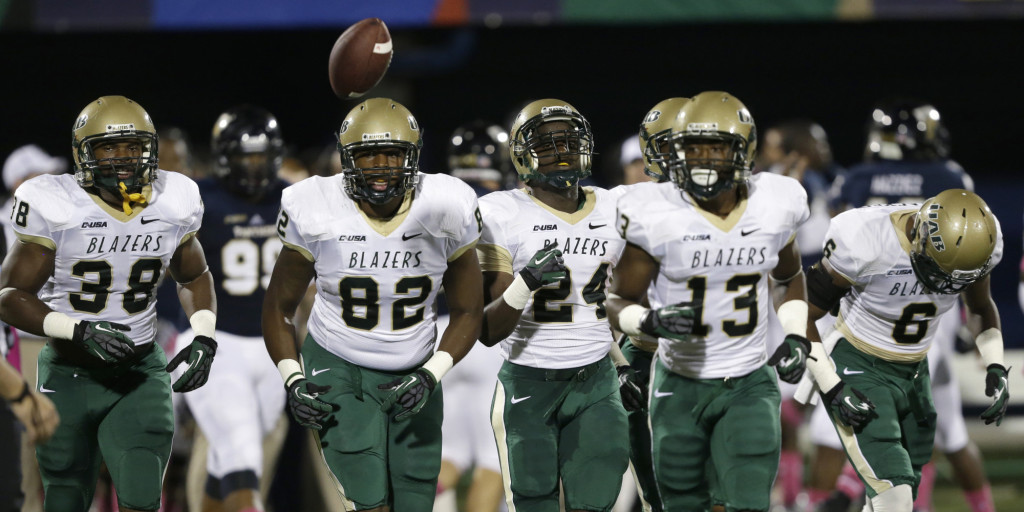
UAB President Ray Watts said Monday he is bringing the football program back as early as 2016, reversing a decision to shut it down because it was too expensive. Watts cited renewed financial commitment from supporters, students and the city as reasons for the change of heart. He said donors have pledged to make up the projected $17.2 million deficit over the next five years if football is restored,. Watts told The Associated Press he decided on Monday morning to reverse the earlier decision after meetings with UAB supporters continued through the weekend. “The biggest single difference is that we now have tangible commitment for additional support that we never had before,” Watts said at a news conference. In addition to reinstating football, Watts said Monday that he was also bringing back bowling and rifle. The study commissioned by the university was based on the programs being brought back in 2016. However, new athletic director Mark Ingram stopped short of guaranteeing 2016, saying only that the goal is to bring football back as soon as possible. Watts cut the programs last December after UAB commissioned a report saying it would cost $49 million over five years to field a competitive football program, generating both a groundswell of criticism for the decision and a rallying of financial support for the Blazers program. The president said UAB has dropped an indoor practice facility from the equation since the initial report, and has raised about 10 percent of the estimated $12.5 million to $14.5 million needed for a turf practice field and new fieldhouse. The December decision left players looking for teams and stirred fans, student and faculty groups to issue no-confidence votes against Watts. “This was a very difficult decision,” he said. “It broke our hearts to make that decision, and we are sorry for any consequences of that. But we are excited today that our community and supporters have come together. Had we not made that decision, which was based on sound information, that we wouldn’t be where we are today. We have never seen this level of support. It has been a painful process at times but it has been a process that has brought us to a new day.” UAB commissioned College Sports Solutions to review the initial report by CarrSports Consulting. The numbers were similar minus the indoor facility. Watts also said UAB’s cost of attendance could be about half the initial projected $5,000 per athlete, based on other Conference USA schools. The first season’s College Football Playoff payout also was higher than UAB had projected. Watts said that the initial projections “showed there was no way for us to cover that unless we took away from education and research and health care.” Watts said UAB sent documents to C-USA and NCAA notifying them of his decision, but he makes it clear UAB plans to remain in the league and play at the FBS level. Without football, UAB would have likely not have remained in C-USA, which has a bylaw requiring members to field football programs. C-USA Commissioner Britton Banowsky said members had not wanted to change the rule because “football is something that is critical to our long-term success and part of our core as a conference.” “It didn’t really come as a great surprise, but we’re very pleased with the decision to bring back football,” Banowsky told The AP. “As a conference, we’re committed to football so we welcome the good news that UAB football has been given another chance.” UAB will cap its subsidizing of athletics to $14.49 million for each of the next five years, about $200,000 less than the university paid in 2014. The City of Birmingham and UAB’s National Alumni Society have each pledged contributions to athletics while student government leaders will raise student fees. Those total $5.3 million with the balance of money coming from private donors. One thing that’s not on the table: UAB building an on-campus stadium to replace aging Legion Field. Watts said that’s up to the city and community to fund. “We will be happy to play in any new, modern facility that the city might choose to build,” he said. “We leave the specific type of facility and the exact location up to the mayor and city leaders and community leaders.” Now comes a huge rebuilding process on the field. Many of the players have moved onto other programs, leaving Clark and his staff to find recruits for 2016. Ingram said bringing football back “will bring a lot of renewed excitement around this program, that’s from top to bottom.” Clark issued a statement saying it was a relief that UAB football was being resurrected. “This is a critical first step toward UAB football’s new path,” Clark said. “It takes tremendous commitment and support to run a successful football program. We have a lot of work to do but we start anew today!” Republished with permission of The Associated Press.
Presidential primary brief: 526 days until Election Day
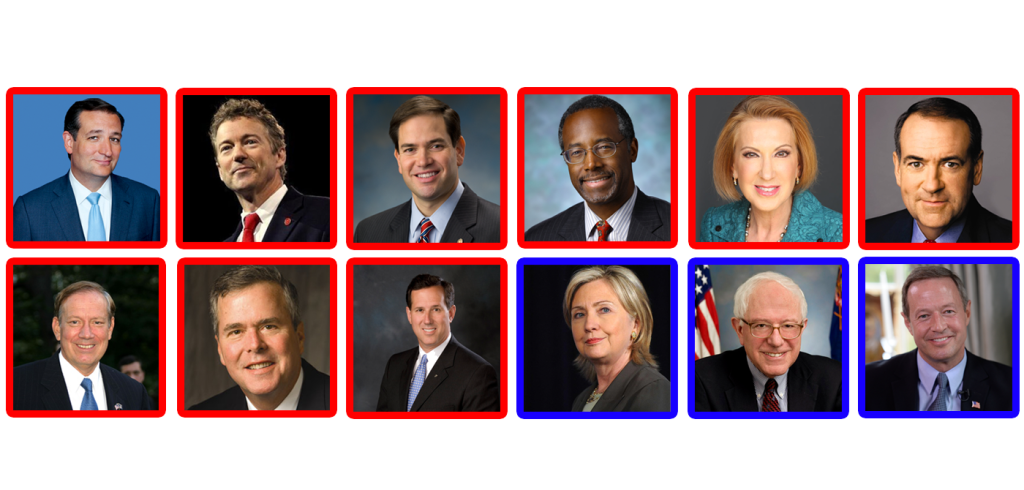
Welcome to a new Monday presidential primary brief provided by Alabama Today. Every week you can find your latest headlines on the presidential primary races as we count down the days until Election Day. 273 days until AL Presidential Primary 526 days until Election Day Convention Dates: Republican July 18-21 2016, Democratic July 25-28 2016 Weekly Headlines: Lincoln Chafee to announce presidential run on June 3 Rick Santorum runs for White House again George Pataki announces 2016 presidential bid For more polling data visit RealClearPolitics. Press Clips: Pro-‐Rand Paul group gets ready to rumble with anti-‐NSA ad (Politico 5/29/15) A super PAC supporting Sen. Rand Paul (R-‐Ky.) for president has released an ad that treats Sunday’s legislative battle over the Patriot Act more like a monster-‐truck rally or a Wrestle-mania tournament. “Get ready America,” the voiceover in the video says as a bald eagle breathes Gire, a bomb explodes and lightning strikes, “for the biggest brawl for liberty of the century.” Nate Silver: What to watch for in 2016 election (Detroit Free Press 5/29/15) Here are several lessons for the 2016 presidential elections from prognosticator Nate Silver, founder of the phenomenally accurate FiveThirtyEight.com. He spoke Thursday at the Mackinac Policy Conference. The nomination of Democrat Hillary Clinton is inevitable, but the general election will be a toss-‐up. Democrats have a weak bench and Republicans have a Give-‐ring circus of overlapping candidates between moderate, establishment, Christian conservative, tea party and Libertarian. “It’s a real tight for space.” New Jersey Gov. Chris Christie is definitely in trouble and former Florida Gov. Jeb Bush is possibly in trouble. “Its very difficult to win the primary when most of the voters don’t like you,” Silver said of Christie. Ben Carson wins Southern Republican straw poll ahead of 2016 presidential election (Christian Today 5/29/15) Doctor-‐turned-‐politician Ben Carson easily won the Southern Republican Leadership Conference straw poll held in Oklahoma on Saturday in the first major survey on the popularity of at least 17 declared or prospective candidates for the Republican Party’s nomination for the November 2016 election. Carson, a popular social conservative who is a Gierce opponent of Obamacare, won 25.4 percent of the vote. Also getting considerable shares of the vote were Wisconsin Gov. Scott Walker and Texas Sen. Ted Cruz who received 20.5 percent and 16.6 percent of the vote, respectively. Sanders wants to debate Republicans (Politico 5/31/15) Bernie Sanders on Sunday called for a more robust debate schedule beginning this summer. The Vermont senator, challenging front-‐runner Hillary Clinton for the Democratic nomination, also proposed on NBC’s “Meet the Press” some debates with Republican White House hopefuls. “We need a lot more debates in this campaign,” Sanders said. “I hope very much that we can begin with the Democratic candidate debates as early as July and have some Republicans in those debates as well.” Ohio Gov. Kasich looks to announce 2016 presidential bid this summer (WaPo 5/27/15) Ohio Gov. John Kasich, who has been actively gauging reactions to a possible campaign for president in 2016, is now moving rapidly to assemble the staff and financial resources for such a bid and is looking to declare his candidacy sometime after June 30, according to knowledgeable Republicans. The two-‐term governor and former House member is running through a checklist before formally entering the race, but strategists close to Kasich and other longtime friends say there is no doubt that he will soon join the crowded Gield of those vying for the GOP nomination. Marco Rubio won’t compete in Iowa Straw Poll (Politico 5/30/15) Sen. Marco Rubio will not participate in the Iowa Straw Poll, his campaign team confirmed Saturday. The Florida senator and 2016 hopeful’s decision marks the latest blow to the August event long considered a staple on the Republican road to the presidential nomination. Jeb Bush, Sen. Lindsey Graham and Mike Huckabee have all said they won’t participate this cycle. Many, including Gov. Scott Walker and Sens. Rand Paul and Ted Cruz have yet to signal whether they will attend. What impact will frustrated veterans have on 2016 election? (Haaretz 5/25/15) Memorial Day in America moves me to predict that one of the stories to watch is the growing bitterness of the veterans of Iraq and Afghanistan. The Associated Press had a piece of this story over the weekend, when it reported that GIs or ex-‐GIs who fought in Iraq “have been watching in frustration” as “Republican presidential contenders distance themselves from the decision their party enthusiastically supported to invade that country.” O’Malley’s long-‐shot bid gets complicated start (Politico 5/30/15) Martin O’Malley’s presidential bid has always been a long-‐shot, but the odds looked even longer Saturday as he officially kicked off his campaign from Federal Hill Park. The run-‐up to his launch here could hardly have been worse, complicated in recent weeks by unrest in the city where he served as mayor and the unexpected early momentum of another Hillary Clinton challenger: Bernie Sanders. At one time, O’Malley figured to be Clinton’s default rival for the Democratic nomination. He won two terms as governor of Maryland, winning by wide margins, and honed his national fundraising chops as chairman of the Democratic Governors Association. Bernie Sanders facing ‘uphill battle’ in Iowa (USA Today 5/29/15) Sen. Bernie Sanders, (I-VT), began his first visit to Iowa since announcing his run in the Democratic presidential primary with a standing-‐room-‐only crowd in the eastern city of Davenport. The Thursday night turnout was more than even the organizers expected. Kevin Perkins, a Davenport resident and planner of the event, said that the auditorium at St. Ambrose University had been set up to seat 300 people. As people poured in, Perkins and other organizers opened up an adjacent room. Perkins estimated that 750 people showed up in total.
Angi Stalnaker: Don’t believe SEC primary hype, Alabama will remain a fly-over state
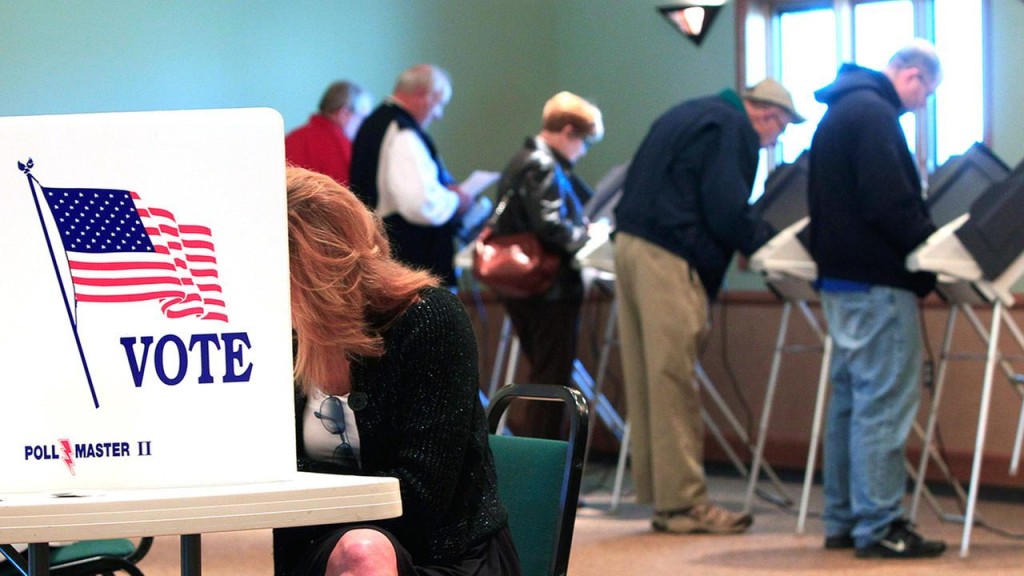
Every campaign junkie in this state watched intently as the Alabama Legislature voted to move the state’s 2016 primary date. Alabama’s political parties have traditionally chosen their nominees in June but, recently, the primary date has been inching its way backward and now Alabama voters will join almost every other SEC football state in heading to the polls on the first Tuesday in March to cast ballots for the Presidential primary. Proponents of the move would have us believe that presidential candidates will be setting up legitimate campaign offices in the Yellowhammer state. Some would argue that moving the primary date will increase Alabama’s relevance on the national stage to the point that frontrunners for the White House will make Alabama a “go to” destination as they battle for the requisite number of delegates to secure their party’s nomination. Candidates will be begging to leave Iowa and New Hampshire to campaign in the Great State of Alabama because our primary is now so early. Candidates are going to make great efforts to listen to and respond to the concerns of Alabamians because now, with a calendar change, they need your vote. I only have one word for these arguments: Ridiculous! A few more legitimate candidates may make a few more brief stop-overs in Alabama on their way from Austin to Atlanta. But, with more potential candidates than the graduating seniors of a rural Alabama high school, we will probably have visits from more than our fair share of secondary candidates who are likely to get fewer presidential votes than Nick Saban. So, if you are waiting to meet the next leader of the free world on a campaign visit to a cotton field in the wiregrass, you are going to be really disappointed. The truth is that the road to the White House is a math problem. You have to secure enough delegates to win your party’s nomination and then enough electoral votes to secure the presidency. Both delegates and electoral votes are based on population and we still don’t have enough of either to make any effect at all on the outcome of any national election. Even when compared with the other states participating in the SEC primary, Alabama is a non-player. Any real front runner is going to devote their precious campaign days to the people of Texas and expend their left-over resources on Georgia. This move has produced some big winners though. The checkbooks of the both major parties will benefit greatly. With a June primary, most of the never-had-a-chance candidates have dropped out and taken their rightful place back in obscurity. That means they don’t pay a qualifying fee to the state party to appear on the Alabama ballot. In early March, some of these candidates have not yet realized that they are destined to become an obscure answer to a Final Jeopardy question in the 2052 Tournament of Champions, so they will enthusiastically send their qualifying fee to the state party. At about $10,000 per candidate, those fees add up fast. Media buyers are also big winners. Presidential candidates won’t be spending a great deal of time singing Sweet Home Alabama but their commercials will become a mainstay on our television sets. By Valentine’s Day, you will gladly take your spouse out to a nice romantic restaurant just so you can escape the constant bombardment of the Crest-white smiles of candidates telling you that they approved this message for the 1 millionth time. So, regardless of what you hear, please rest assured that Alabama is still safely a fly-over state and those commercials will be off of your television before you know it. Angi Stalnaker is Alabama native and political consultant who has worked on numerous statewide, legislative and constitutional amendment races for conservative causes and candidates. She is the founder of Virtus Solutions, a full service government relations and communications firm.
Lindsey Graham, sees world of peril, opens 2016 bid
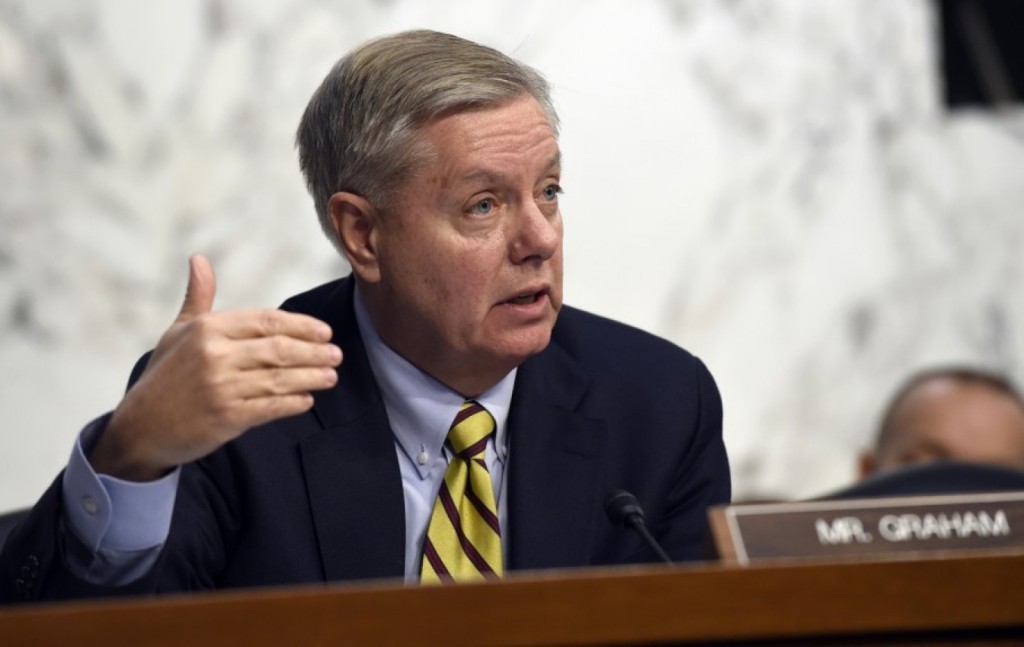
South Carolina Sen. Lindsey Graham opened his campaign for the Republican presidential nomination Monday with a grim accounting of radical Islam “running wild” in a world imperiled also by Iran’s nuclear ambitions. He dedicated himself to defeating U.S. adversaries, a commitment that would place thousands of troops back in Iraq, essentially re-engaging in a war launched in 2003. “I’ve got one simple message,” he told supporters in Central, S.C., the small town where he grew up. “I have more experience with our national security than any other candidate in this race. That includes you, Hillary.” In that fashion, he took on Democratic candidate Hillary Rodham Clinton, the former secretary of state, as well as non-interventionists in his own party and rivals with little to no foreign policy experience. Graham, 59, becomes the first candidate in either party to hail from one of the first four states that cast presidential primary ballots. Iowa and New Hampshire lead the process, followed by South Carolina and Nevada. Having won his third term in November, Graham is a prominent Senate voice in seeking a more muscular foreign policy and one who casts the threats facing the United States in particularly dark terms. “Simply put, radical Islam is running wild,” he said. “They have more safe havens, more money, more weapons and more capability to strike our homeland than any time since 9/11. They are large, they are rich, and they’re entrenched.” He said as president, he’d “make them small, poor and on the run.” “I’m afraid some Americans have grown tired of fighting them,” he said. “I have bad news to share with you: The radical Islamists are not tired of fighting you.” Despite his focus on Islamic State militants with footholds in those two nations, Graham said Iran poses the gravest threat. If the U.S. does not head off a nuclear capability in Iran, Graham said, “Iran will trigger a nuclear arms race in the least stable region on Earth, and make it more likely that people who aspire to genocide will have the most effective means to commit it.” He said recently there is no avoiding the reality that more Americans will have to fight and die to defend the country. His approach contrasts with that of fellow senator and presidential candidate, Kentucky’s Rand Paul, who favors less military intervention. His blunt talk about more troops and casualties stands out even among other Republican contenders who promise to quash Islamic State militants, but sidestep details. Polls suggest a majority of American adults support military action against the group commonly called ISIS. But support drops when respondents are asked specifically about a ground war. Graham came to Congress an outspoken member of the conservative freshman class that brought Republicans a majority in 1994. Yet he’s since joined with Democrats on some contentious votes. He backed a 2012 immigration overhaul and voted to end a 2013 partial government shutdown, for example. He also backed President Barack Obama‘s two Supreme Court nominees. That earned Graham enmity among some Republicans, but he said Monday his willingness to “work with anybody” is necessary. Graham said wealthier members of his generation will have to take fewer Social Security and Medicare benefits, while younger workers may have to work longer and pay more. “We have to fix entitlement programs to make sure people who need the benefits the most receive them,” he said. “That’s going to require determined presidential leadership.” That statement impressed Daniel Nichols, 35, of Central, S.C. “You know, I think he may be right on Social Security,” Nichols said. “I wonder if he’s being a little too truthful when he says that, though.” Graham leaned heavily on his personal story Monday, delivering his speech in front of the building where he grew up and his parents ran a pool hall, bar and restaurant. Graham’s parents died when he was in college, leaving him as guardian to his then 13-year-old sister, Darline. “We depended on Social Security benefits to survive,” Graham said. “As president, I’ll gladly do what it takes to save a program that once saved my family.” Graham planned appearances this week in New Hampshire and Iowa if the Senate schedule lets him go. Republished with permission of The Associated Press.
Rep. Jack Williams wins #FREEUAB fight
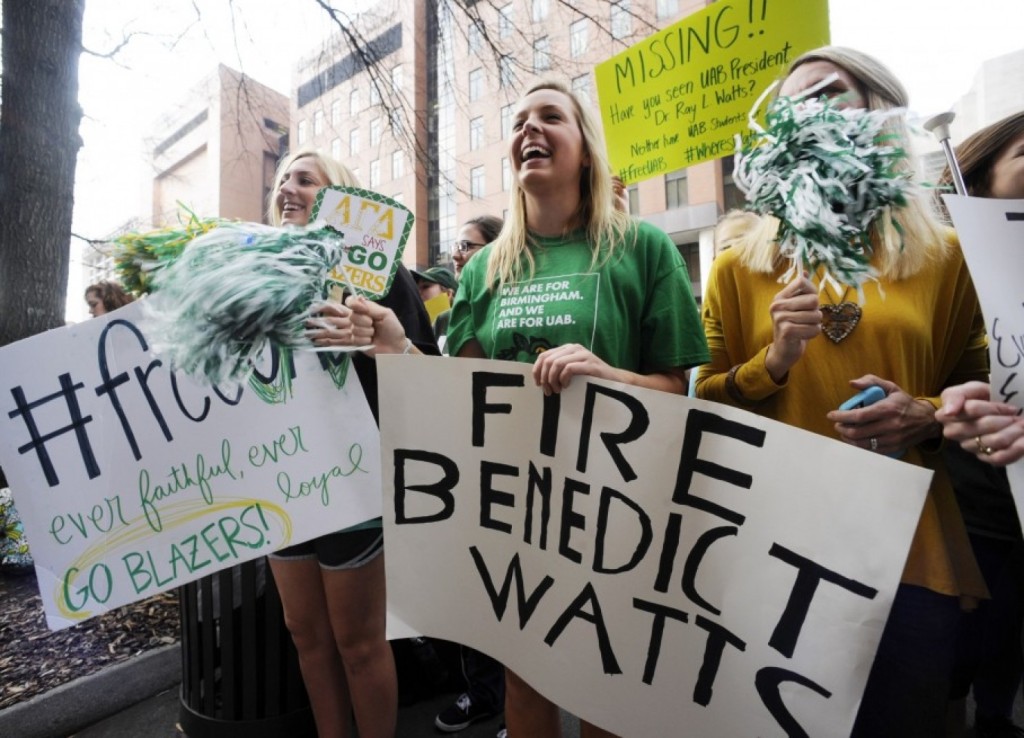
According to Associated Press reports detailed below, UAB is set to announce at 4 p.m. that they are bringing back football. While this is a win for the schools athletic program as a whole no one can discount the role that Rep. Jack Williams played in keeping the heat turned up on the #FreeUAB fight. Williams was a relentless fighter for program constantly pushing for its reinstatement and questioning the timing and reasons behind it’s abrupt ending. Alabama Today has reached out to Williams and will update this story with more details as they become available. From the AP: UAB President Ray Watts is bringing the football program back. Watts told The Associated Press that he decided on Monday morning to reverse the earlier decision after meetings with UAB supporters continued through the weekend. He says donors have pledged to make up the estimated $17.2 million deficit over the next five years if football is restored. Watts was scheduled to announce the decision to reinstate football, bowling and rifle in 2016 later Monday. He cut the programs last December after UAB commissioned a report saying it would cost $49 million over five years to field a competitive program. Watts says they have dropped an indoor practice facility from that equation, but are still raising about $13 million toward a turf practice field and new fieldhouse. Without football, UAB would have likely not have remained in Conference USA. AP content contained within this post is republished with permission of the Associated Press.
Starting his 2016 campaign, Lindsey Graham is blunt on Middle East
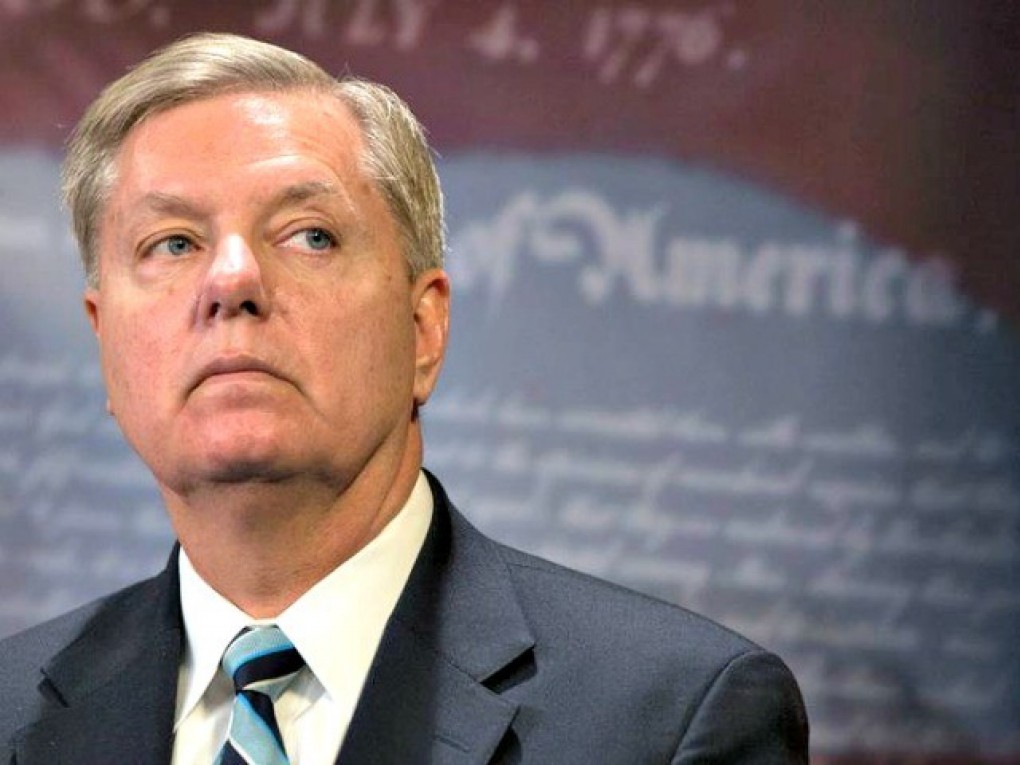
Lindsey Graham will formally launch his bid for president in the small South Carolina town where he grew up. His White House ambitions are rooted half a world away in the Middle East. When kicking off his campaign Monday, South Carolina’s senior senator is sure to blast President Barack Obama‘s withdrawal of troops from Iraq, insist on the need to strong-arm Iran over its nuclear program and work to subdue the violent Islamic State militants who have gained footholds in Iraq and Syria. Yet in the early days of the 2016 campaign for president, Graham has already gone further than most of his rivals for the GOP nomination in saying how he would tackle such problems, while acknowledging the potential costs of his strategy. Graham wants to put an additional 10,000-plus U.S. troops into Iraq, adding to the several thousand there now working as trainers and advisers only. He says it could take even more troops to stabilize the Middle East over time, adding “more American soldiers will die in Iraq and eventually in Syria to protect our homeland.” The Islamic State militants, Graham argued at a recent campaign stop, “want to purify their religion and they want to destroy ours and blow up Israel. Every day they get stronger over there, the more likely we are to get hit over here.” He added, “I don’t know how to defend this nation, ladies and gentlemen, with all of us sitting here at home.” It’s a calculated risk for the 59-year-old three-term senator and retired Air Force lawyer who surprised many when he began to hint earlier this year he would run for president. A February poll conducted by the Pew Research Center found 63 percent of adults backed some kind of military campaign against the Islamic State group, compared to 30 percent who disapprove. When asked about using ground troops, support dropped to 47 percent – with 49 percent opposed. Further, the same survey found Americans almost evenly divided on whether military force is “the best way to defeat terrorism” or whether it “creates hatred that leads to more terrorism.” Graham’s hawkish approach stands in stark contrast to his fellow U.S. senator and presidential candidate, Kentucky’s Rand Paul, who favors less military intervention abroad. It’s also notable for its specifics, especially his warning that U.S. troops are likely to perish in the Middle East as part of his approach. While New Jersey Gov. Chris Christie said in a recent speech in Georgia that “we should work with our allies that want to stand against ISIS,” he’s described that role as helping with the “weapons, equipment and training” needed for a “long fight.” Wisconsin Gov. Scott Walker says he’d “take the fight to them before they take the fight to us,” but he has yet to detail what that entails. Florida Sen. Marco Rubio, writing over the weekend in The Washington Post, said the U.S. should increase the number of American troops in Iraq, but unlike Graham, didn’t say how many ought to deploy. While Graham barely registers now in national polls that will be used to determine which candidates are invited to the GOP’s presidential primary debates beginning this summer, he argues Republican voters will reward him for his blunt talk about future American casualties. “Look, I know from polling that (national security) is the No. 1 issue in Iowa and New Hampshire” among likely GOP voters, he said. “And I’ve been more right than wrong,” he adds, noting that he was an early supporter of the troop “surge” in Iraq under President George W. Bush and was always critical of Obama’s effort to reduce the U.S. presence in Iraq. Graham hammers Obama for not playing a more active role in establishing a functioning, democratic government in Libya after revolutionaries toppled Moammar Gadhafi in 2011. And he insists that Obama’s work to reach a nuclear accord with Iran is in vain, because the Iranians are “liars” who won’t stick to whatever inspections and restrictions make up an eventual deal. “To the Iranians: You want a piece of a nuclear power program, you can have it,” Graham says as part of his standard campaign speech. “If you want a bomb, you’re not going to get it. If you want a war, you’re going to lose it.” After a pause, he adds, “There’s no other way to talk in the Mideast.” Republished with permission of The Associated Press.
New prison commissioner Jeff Dunn says overcrowding at root of other problems
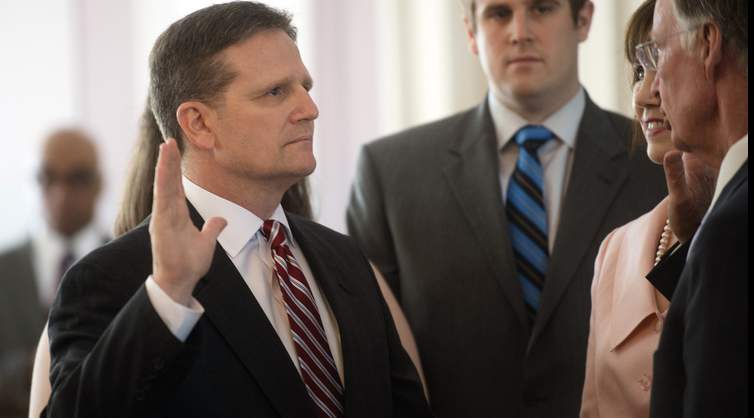
Alabama’s new prison chief has been on the job less than two months, but he says it’s clear that overcrowding is the overall problem that covers many of the systems other challenges: security risks, staffing levels, officer turnover and culture. “It is readily acknowledged for almost two decades the state has struggled to adequately resource the prison system,” Department of Corrections Commissioner Jeff Dunn said. “When you should have 10 officers for a particular area or function, and you only have six or you only have five then it’s obvious to be at least those five officers are having to do the work of 10 … It raises our security risk,” Dunn said. Dunn in April took the helm of a prison system with well-documented troubles. State prisons in January housed 25,102 inmates in facilities designed to hold 13,318, putting the system at 188 percent capacity. The crowding level has contributed to risky conditions for those on both sides of the prison bars. “We have significant resource challenges and they are chronic. They are not recent. In large institutions that have been chronically under-resourced, that results in security issues, personnel issues, facility maintenance issue and it also results in cultural issues,” Dunn said. The new head of the state prison system does not have a background in running state prisons. And that is by design. Dunn, a native of Alabama, retired as a colonel from the Air Force in March after a 28-year career. His most recent command was of the Thomas Barnes Center for Enlisted Education at Maxwell Air Force Base in Montgomery. He also served as vice commander of the 14th Flying Training Wing at Columbus Air Force Base, Mississippi and as deputy director for combating terrorism and support activities for the office of the Secretary of Defense. Gov. Robert Bentley, when he swore in Dunn, said he was specifically looking for someone from the outside to make changes in a system, where critics have accused the state of letting problems and problem personnel linger. Dunn said he has experience with “large complex organizations” where problems and decisions are rarely simple. Dunn’s challenge is getting up to speed on how corrections operates. He has spent the last six weeks studying the system. He said his top task this summer is to spend time on the ground in the prisons. He spends a lot of time asking,” Why do we do it that way?” and asking staff what they need to do their jobs better. “I think the vast majority of the men and women in this department are professional, faithful public servants who want to do the right thing and want to serve the state in an honorable and faithful manner. I believe that. I do believe, just like any large institution, we have some folks aren’t on board with that and we’re going to address that.” Two state prisons in particular have been in the spotlight. The U.S. Department of Justice on Thursday announced a settlement agreement with the state over conditions at Tutwiler Prison for Women where federal officials say inmates were subjected to an unconstitutional climate of constant sexual abuse and harassment. Bryan Stevenson, executive director of the Montgomery-based Equal Justice Initiative, said the while the state has focused on improving Tutwiler, conditions at other state prisons have gotten “dramatically worse” over the last 18 months Stevenson’s organization initially raised the alarm about Tutwiler and has sued the state over violence at another prison. Republished with permission of the Associated Press.


